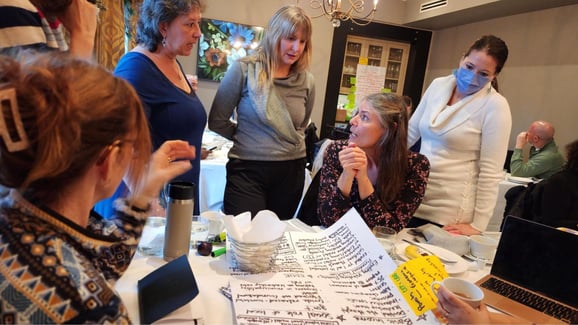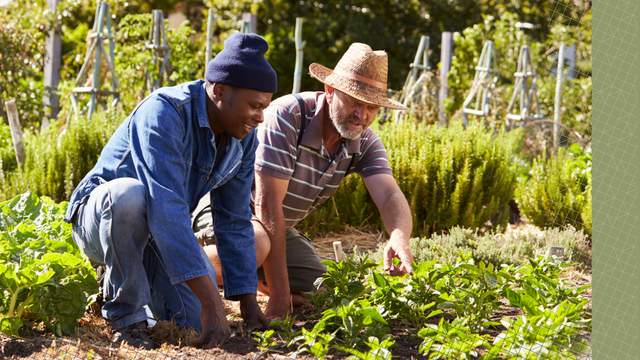
Written by Sylvia Cheuy and Lisa Attygalle
In late fall 2023, our team at the Tamarack Institute spent a week together reflecting on the progress we’d made on our strategy and 2030 Plan, the dynamics at play in our communities and around the world, what our learners have been telling us, and how we might best support and connect them to maximize the impact of their changemaking work – both locally and across systems.
Some anchoring assumptions
Our conversation was anchored in a handful of assumptions about what we at Tamarack understand about our current reality and the work of community change. These include:
- Place matters – We recognize the uniqueness, ingenuity, and capability of local communities. They are key drivers of innovation and transformation in how to address our most pressing social and environmental issues. As author Meg Wheatley has repeatedly said, “Whatever the problem, community is the answer.”
- Complex issues require collaboration – We anticipate that the scope, scale, and interconnectedness of social and environmental issues confronting communities will continue to accelerate in 2024. We know that multisector collaboration is required to generate the necessary whole-community responses to address these issues.
- Context expertise is essential – The knowledge and contributions of ordinary people are the biggest untapped resources in the work of community change. In particular, the wisdom and insights of individuals with first-hand experience of an issue are essential to identifying barriers and co-designing new solutions.
- Essential skills are needed for community & systems impact – There are five essential skills that local champions collectively need to effectively design and lead a local change effort. They are community engagement, collaboration, impact evlauation, collective leadership and community innovation. These skills operate in an interconnected way and, together, establish a framework for community and systems impact.
As our team’s conversation unfolded, we identified three big ideas that are foundational to the work of community change that we have committed to diving into more deeply over the coming year. They are all ideas that require us to challenge the status quo, and each offers the potential to be transformative – powerfully shifting how individuals, organizations, sectors, and communities think, act, and interact.
Three big ideas in community change for 2024
1. Advancing equity & shifting the locus of power – Championing equity is committing to ensure that all people experience fairness and justice in their ability to access opportunities. It recognizes that different groups and populations currently experience marginalization due to structural constraints that limit their ability to thrive. The work of community change is inextricably linked to the addressing current and historic inequities. This requires knowledge of who is experiencing marginalization and an understanding of why and how that marginalization is created and strategies that include targeted actions for change.
At its core, the work of advancing equity is about rebalancing power. We are keen to better understand the role of power in the work of community change. What mindsets and behaviours are needed to shift power imbalances? What role does self-reflection and personal change play in advancing equity and rebalancing power? What strategies, practices, policies, and tools are effective at rebalancing power? How might community-led work and equitable decision-making processes contribute to redistributing power and advancing equity?
2. Cultivating adaptive leadership in unstable times – The work of community change requires committed leadership with the humility to admit that the status quo is unacceptable and that better outcomes are possible. It requires strategies that are emergent and adaptive that hold up to uncertainty and disruption. It also requires us to believe in a different future—to have hope, to move through despair—and to inspire others.
This year, we will be exploring how we can be nimble and responsive within community change initiatives. Do your current practices allow for adaptation as we collectively learn and respond? What strategic, planning, or convening practices need to change? How can we keep the common agenda at the core of what we're doing to inspire hope? How do we manage conflict in mindset or opinion? What supports are needed to sustain leaders—individually and collectively—to forge a path towards a new and better future for all?
3. Enabling Systems Transformation – Making lasting change around the complex social issues of our time requires an ability to see and willingness to change the systems that are unintentionally contributing to the very issues we want to address. As changemakers, we are not separate from our current systems, but can often be unaware of our role, implications, or impacts. How can we strengthen our ability to see system dynamics?

From Left to right: Sylvia, Lisa, Jill, and Natasha
Tamarack's 2023 Team Gathering: some Learning Centre Consulting Directors
and the Ending Poverty team brainstorming & collaborating on refining our 2030 Goals.
Exploring systems transformation
This year, we will be exploring how systems are transformed. How do we need to think about comprehensive strategies that connect work at different scales and from various complementary roles? How do we evaluate systems change and better understand the time horizons for systems transformation?
We will continue exploring the role of field catalysts who play a unique and often invisible role in advancing systems transformation because of their ability to support, link, and amplify local change efforts to achieve systems-level impact. Our key question this year is "How might this role and function be better understood and leveraged?"
Community and systems change is as much an internal learning journey as it is a set of external actions. As you enter 2024, what commitments to do want to make for how you carry out your work? What’s the next right thing for you?
Join us on this learning journey
- Continue reading Engage! each month where we will be exploring these big ideas.
- Join us in our Changemaker Experience – a cohort exploring all facets of the community and systems impact approach including the core principles that drive place-based change forward.
- Build your foundations in the skills for community change through an online course or workshop.





